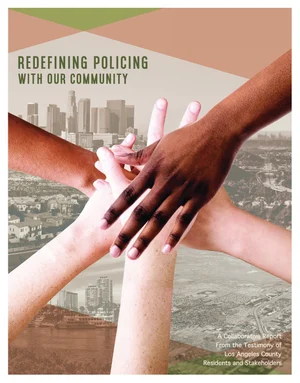
Press Release June 22, 2020

FOR IMMEDIATE RELEASE
June 22, 2020
LA County Commission on Human Relations releases “Redefining Policing with Our Community” Report
Comprehensive Community-Informed Report Provides 34 Recommendations to Advance Equity, Transparency, and Accountability in Policing
LOS ANGELES, CA – Today, the Los Angeles County Commission on Human Relations released “Redefining Policing with Our Community,” an extensive report on policing and human relations in LA County with 34 recommendations for change. It seeks to “build a new normal that prioritizes human dignity and repairs the damage done by discriminatory policies and practices.”
The Policing and Human Relations project was launched in 2015 to commemorate the 50th anniversary of the 1965 Watts Rebellion. The report was developed after conducting seven public hearings across each of the five LA County Supervisorial Districts. The process included 38 feedback sessions with 42 stakeholder groups and organizations; targeted meetings with women of color, members of the LGBTQ+ community, more than 50 community-based organizations, County residents, and advocates. The Human Relations Commission also convened meetings with the LA County Sheriff’s Department, the Los Angeles Police Department, and other city-based police departments throughout the County.
“Redefining Policing with Our Community” may be downloaded by clicking here.
“To assess policing in LA County 50 years after the Watts Rebellion was an ambitious undertaking,” stated Commissioner Isabelle Gunning, chair of the Commission’s Committee on Policing and Human Relations, which led the development of this report. “Through this Report, our hope is to bring about systemic and cultural changes in policing that will honor George Floyd and the many others whose lives have been lost or damaged.”
Informed by community and key stakeholder perspectives, “Redefining Policing with Our Community” focuses on the primary intercept points of the criminal justice system: prevention, community intervention, and law enforcement response.
The report, which reflects the experiences and reform priorities of key stakeholders and County residents, is centered on nine broad strategic aims, which include: increasing transparency and accountability, revising use-of-force policies, ending overpolicing and underprotection of vulnerable communities and enhancing community-based alternatives to law enforcement.
The report’s 34 recommendations advance action-oriented solutions that reflect broad community agreement, including the reallocation of resources for economic investments to improve and expand social safety nets, alleviating militarized community occupation, and the utilization of a culturally competent justice framework.
Some of the 34 recommendations include:
Changing federal and state laws, in addition to local law enforcement policies, to end qualified immunity, and provide public access to information about police officers involved in both complaint and misconduct investigations, including their prior history and the results of those investigations;
Significantly increase funding, including the reallocation of law enforcement budgets, for non-law enforcement community-based initiatives, such as: drop-in and sobering centers, and community response teams that proactively address core issues of poverty, education, health, safety, and youth development programs;
Assign use-of-force investigations to independent special prosecutors housed outside of law enforcement agencies and the district attorney’s office; and
Require deeper analysis and more frequent dissemination of data collected through the Racial and Identity Profiling Act (RIPA) to eliminate anti-Black racism, bias, and discrimination.
“It is unconscionable that our communities of color are treated differently on account of race and ethnicity, and this plays out every day in their interactions with our criminal justice system. We need to push for true police accountability and denounce police brutality and harassment,” said Los Angeles County Supervisor Hilda L. Solis. “Our black and brown families should not live in fear of being racially profiled when they go out for a walk or a jog in our neighborhoods. We must take bold action to redefine public safety and ensure that the criminal justice system works for all of us, regardless of race. Now is the time to dismantle institutional racism and put an end to systemic inequities that are jeopardizing the lives of so many innocent individuals within our black and brown communities.”
“Recent events have provoked a conversation about how we expand alternatives to law enforcement and how we continue along the continuum of reimagining public safety,” said Supervisor Ridley-Thomas. “Many of the recommendations laid out in this report are yet another opportunity for the County to invest in change that is systematic, lasting, and that gets to the root of the issue rather than skimming the surface.”
“This report is one more call to action at a critical moment in the County’s rethinking of our justice system,” said Supervisor Sheila Kuehl. “Many of the recommendations echo guidance offered to the Supervisors in the Alternatives to Incarceration “Care First, Jail Last” report last March. What we need to do to improve community health and safety is clear. Now it’s time to move forward quickly to implement these reforms.”
“This report provides an important perspective emerging from the Commission’s extensive engagement with community and law enforcement,” said Connie Rice, renowned civil rights attorney and member of President Obama’s taskforce on 21st Century Policing. “It calls for changes that can move us forward on the urgent transformation in the culture and mission of policing that we so desperately need.”
Hearing transcripts, stakeholder feedback, and other supplemental materials collected as part of this report are available for review on the Commission on Human Relations’ website at hrc.lacounty.gov.
The Los Angeles County Commission on Human Relations’ mission is to transform prejudice into acceptance, inequity into justice, and hostility into peace. It is dedicated to promoting positive human relations on a foundation of protection for human rights in an increasingly complex and multicultural county. The Commission works to develop programs that proactively address racism, homophobia, religious prejudice, linguistic bias, anti-immigrant sentiment, and other divisive attitudes that can lead to intercultural tension, hate crimes, and related violence. Partnering with schools, cities, community-based organizations, youth, academics, policy makers, businesses, law enforcement, and other leaders, the Commission brings key players together to resolve immediate intercultural conflicts and to work toward the longer term aim of eradicating bias and prejudice.
###
Contact: Michael Kapp, Director of Public Affairs
(213)-706-8140, mkapp@wdacs.lacounty.gov